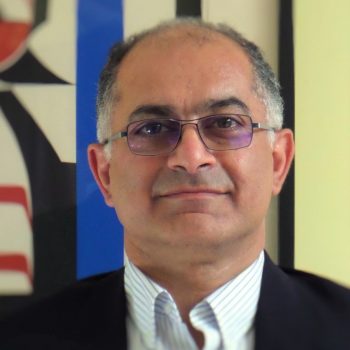
Hadi Dowlatabadi
Professor Emeritus, Canada Research Chair (T1, Applied Mathematics of Global Change)
Contact Details
AERL Room 422
2202 Main Mall
The University of British Columbia
Vancouver, BC V6T 1Z4
Canada
http://blogs.ubc.ca/dowlatabadi/welcome/
Research Interests
Bio
Hadi Dowlatabadi’s research is at the nexus of humans, technology and the environment. He has studied climate change and its related response strategies since 1986. His projects are solution oriented and usually fall outside familiar disciplinary grounds. He sees the world as a dynamic non-equilibrium heterogeneous system where the search for complexity leads to paralysis and over-simplification spells trouble.
Hadi has a wide range of publications from books on how to choose electricity generation technologies to different determinants of malaria around the world. He has over 150 peer-reviewed papers and has supervised almost three-dozen PhDs. He serves on the editorial boards of five journals. Hadi is a co-founder of half a dozen companies attempting to refine and market technologies that pave the way to a zero carbon economy. He is a University Fellow at Resources for the Future, a Washington DC think-tank. He is also Adjunct Professor at Carnegie Mellon University’s Department of Engineering & Public Policy.
Website: http://blogs.ubc.ca/dowlatabadi/welcome/
Google Scholar: https://scholar.google.ca/citations?user=9pMu_28AAAAJ&hl=en
Prospective Students/Colleagues
Hadi retired in July 2022 and will no longer be accepting new advisees. However, he advises that you can find many potential supervisors at UBC using the Graduate School’s Supervisors Search Tool.
Hadi encourages the use of keywords to search on the site above for topics that match your interests. Having found a few suitable supervisors, one should then search for their publications on Google Scholar and read at least three papers from each potential supervisor. Applicants can use supervisors’ websites to contact some of their current and past students. These students can advise if the university and researcher have been supportive and met their needs — or at least highlight some of the challenges that will need to be addressed should one get into that program. Having completed all this research, one can decide who to work with and can proceed with contacting them. When writing to professors, mention their work explicitly. This step to the search for a position in academia is critical to finding a supportive mentor.
Projects
Energy & Climate Change
, – ,
Hadi is interested in energy poverty and carbon footprints. When it comes to decarbonizing the built environment, the dysfunction in management of transition at various levels of government needs to be addressed. There is a need for realistic multisector responses that include many other elements of global change beyond climate.
Environmental Protection & Development
, – ,
Environmental protection is only meaningful when total exposure to harm can be held below an acceptable level of impact. New projects should only be possible if there is room to pollute without violating that threshold. Guiding questions include: How are criteria for evaluating new projects set? How are these monitored and are violations punished? Should we be rethinking what cumulative effects assessment means?
The Built Environment
, – ,
High performance buildings perform so poorly; Hadi and team ask why this is the case. They also ask whether Integrated Project Delivery provides a better platform for building better buildings. Research also focusses on how the City of Vancouver can reduce the barriers to existing buildings for meeting their zero emissions target.
Assuming responsibility for intergenerational transfers
, – ,
Our physical, cultural, legal and ecological environment is a cumulative legacy of past generations. Our actions modify these and pass them on to future generations. Most people living in richer countries have no appreciation of how they came to be so fortunate, at the cost to those living poorly in their own vicinity and beyond. Colonialism, climate change and cultural tsunamis are all such legacies. Do we recognize what led to our good fortunes? Are we willing to redress impacts from past actions?
Courses
RMES 507 Human and Technological Systems
RMES 520 Climate change: science, technology and sustainable development
RMES 542 Intro to Integrated Assessment